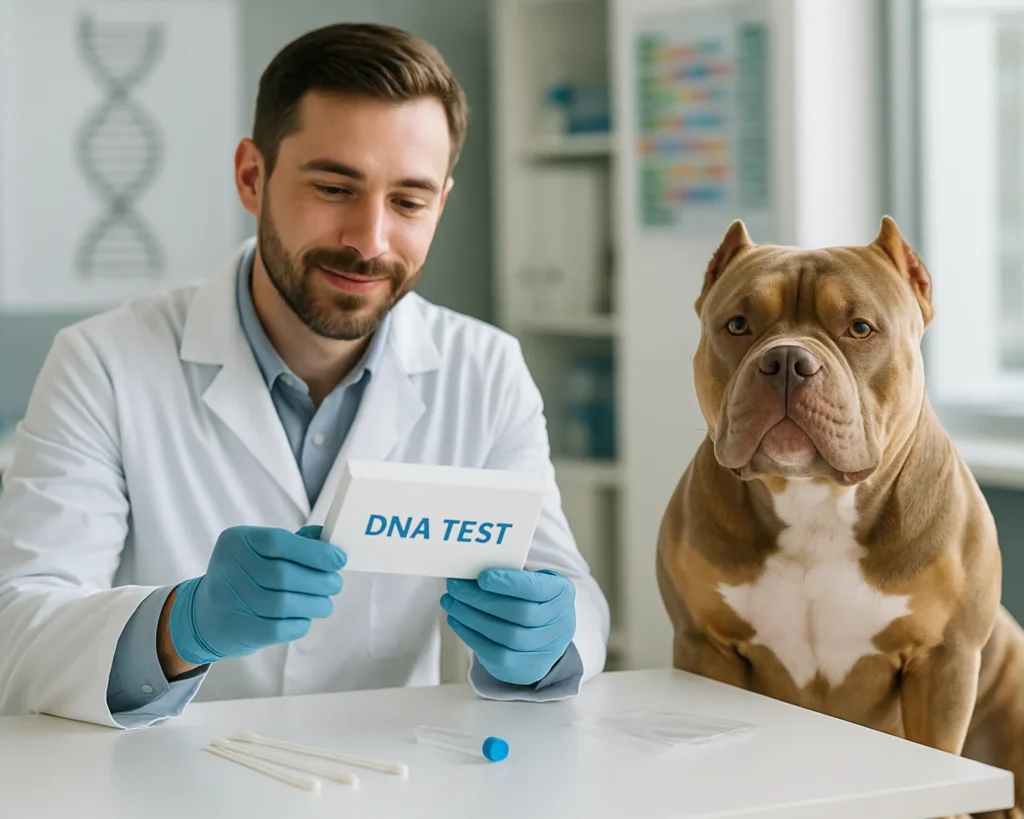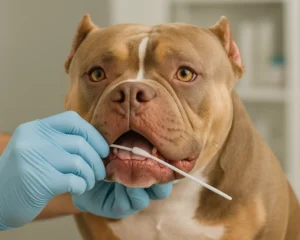Dog DNA testing has transformed from a novelty into an essential tool for serious show dog breeders and owners. The canine DNA testing market reached $144.4 million in 2024 and is projected to grow to $234 million by 2030, reflecting the increasing recognition of genetic screening’s value in breeding programs and health management. For bully breed enthusiasts and show dog handlers, DNA testing provides scientific validation of bloodlines, identifies potential health concerns before they manifest, and offers competitive advantages in producing champion-quality dogs.
Understanding your show dog’s genetic makeup goes beyond simple breed verification. Modern DNA tests reveal hereditary health markers, trait predictions, and ancestry information that inform breeding decisions and training approaches. This comprehensive genetic insight helps breeders maintain the integrity of bloodlines while proactively addressing health concerns that could affect show performance or long-term wellbeing. The American Kennel Club recognizes DNA testing as a valuable tool for responsible breeding and health screening.
Why DNA Testing Matters for Show Dog Breeders
Show dog breeding demands precision and accountability. Judges evaluate dogs based on breed standards that encompass physical characteristics, temperament, and movement. DNA testing provides objective verification that your breeding program produces dogs meeting these standards while maintaining genetic health. This scientific approach replaces guesswork with data-driven decisions that enhance breeding outcomes and protect your reputation as a quality breeder.
For bully breed breeders specifically, DNA testing addresses common concerns about breed purity and health predispositions. American Bullies, for instance, can carry genetic markers for conditions like hip dysplasia, heart issues, or skin allergies. Identifying these markers before breeding allows you to make informed pairing decisions that minimize health risks in offspring. This proactive approach produces healthier puppies and demonstrates your commitment to breed improvement and responsible breeding practices.
Bloodline Verification and Breed Purity
Establishing and maintaining champion bloodlines requires meticulous record-keeping and verification. DNA testing provides irrefutable proof of parentage and breed composition, essential for registration with kennel clubs and breed associations. This verification protects buyers who invest significant resources in show-quality puppies and safeguards your breeding program’s integrity against questions about lineage authenticity.
Mixed ancestry can appear unexpectedly in breeding programs, even with careful pedigree documentation. DNA testing identifies these instances before they compromise breeding plans or show careers. For show dogs where breed purity directly impacts eligibility and judging outcomes, this verification is invaluable. Understanding your dog’s complete genetic background also helps explain unexpected physical traits or temperament characteristics that might otherwise puzzle breeders and handlers.
Health Screening and Disease Prevention
Genetic health screening represents one of DNA testing’s most significant benefits for show dog breeders. Tests identify carriers of hereditary diseases, allowing breeders to avoid producing affected puppies through strategic pairing decisions. This preventive approach reduces the heartbreak of genetic diseases and protects breeding program investments by ensuring puppies meet health standards required for show careers.
Many genetic conditions don’t manifest until dogs reach maturity, potentially after significant training and show preparation investments. DNA testing reveals these predispositions early, enabling proactive health management and informed decisions about show careers. For conditions manageable through diet, exercise, or medical intervention, early identification allows you to implement preventive measures that keep your show dogs performing at peak levels. Learn more about maintaining optimal health in our guide on keeping your dog at peak performance.
What Dog DNA Tests Reveal About Your Show Dog
Modern canine DNA tests analyze hundreds of genetic markers to provide comprehensive insights into your dog’s genetic makeup. Understanding what these tests reveal helps you maximize their value for breeding decisions and show dog management. The depth of information available through DNA testing continues to expand as genetic research advances, offering increasingly detailed insights into canine genetics.
Breed Composition and Ancestry
DNA tests identify breed percentages in your dog’s genetic makeup, typically tracing back three to four generations. For purebred show dogs, this confirms breed purity and identifies any unexpected ancestry that might affect show eligibility. The tests compare your dog’s DNA against extensive breed databases, providing percentage breakdowns and often visual representations of genetic heritage.
Ancestry information extends beyond simple breed identification to reveal geographic origins and historical breeding patterns. This context enriches your understanding of your dog’s lineage and can inform breeding decisions by identifying desirable genetic lines. Some advanced tests even connect your dog with genetic relatives in their databases, potentially revealing previously unknown connections to champion bloodlines.
Genetic Health Markers and Disease Risks
Health screening panels test for genetic markers associated with over 200 hereditary conditions common in dogs. These include orthopedic issues like hip and elbow dysplasia, cardiac conditions, eye diseases, and metabolic disorders. Results indicate whether your dog is clear, a carrier, or at risk for each tested condition, providing actionable information for breeding and health management decisions.
Understanding carrier status is particularly important for breeders. A dog carrying one copy of a recessive disease gene appears healthy but can produce affected puppies if bred to another carrier. DNA testing identifies these carriers, allowing strategic breeding choices that avoid producing affected offspring while preserving valuable genetic lines. This knowledge is essential for responsible breeding programs focused on improving breed health.
Physical Traits and Performance Characteristics
DNA tests increasingly reveal genetic markers associated with physical traits like coat color, size, and body structure. Some tests also identify genes linked to performance characteristics such as endurance, muscle development, and trainability. While environmental factors significantly influence these traits, genetic predispositions provide valuable insights for show dog selection and training approaches.
For show dog breeders, trait prediction helps identify puppies with the greatest show potential early in development. Understanding genetic predispositions for desired characteristics allows more informed selection decisions, potentially reducing the time and resources invested in dogs less likely to succeed in competition. This predictive capability becomes increasingly valuable as genetic research continues to identify additional trait-associated markers.
Top DNA Testing Companies for Show Dog Breeders
Several reputable companies offer canine DNA testing services, each with different strengths, test panels, and pricing structures. Selecting the right testing service depends on your specific needs, whether focused on breed verification, health screening, or comprehensive genetic analysis. Understanding the differences between major providers helps you choose tests that deliver the most value for your breeding program.
Embark Dog DNA Test
Embark is widely regarded as the most comprehensive canine DNA testing service available. Their breed identification test analyzes over 350 breeds and tests for more than 230 genetic health conditions. The company partners with Cornell University College of Veterinary Medicine, lending scientific credibility to their testing methodology. Embark’s detailed reports include ancestry information, health screening results, trait predictions, and relative finder features that connect your dog with genetic relatives in their database.
For show dog breeders, Embark’s comprehensive health screening panel provides extensive information for breeding decisions. The test identifies carriers of genetic diseases, allowing strategic pairing to avoid producing affected puppies. Results typically arrive within 2-4 weeks, and the company offers excellent customer support and veterinary consultation options for interpreting complex results.
Wisdom Panel
Wisdom Panel, owned by Mars Veterinary, offers several testing tiers ranging from basic breed identification to comprehensive health screening. Their Premium test screens for over 200 genetic health conditions and provides detailed breed ancestry information. Wisdom Panel’s extensive breed database includes rare and emerging breeds, making it particularly valuable for breeders working with less common varieties.
The company’s health screening focuses on medically actionable conditions where test results can inform preventive care or breeding decisions. Their reports are designed for easy interpretation, with clear explanations of genetic risks and recommendations for follow-up with veterinarians. Wisdom Panel’s established reputation and competitive pricing make it a popular choice among show dog breeders.
Orivet Genetic Pet Care
Orivet distinguishes itself by offering breed-specific testing panels tailored to genetic health concerns relevant to particular breeds. This targeted approach provides in-depth screening for conditions most likely to affect your specific breed, potentially offering better value than broad-spectrum tests. Orivet also provides life plan services that deliver personalized health and wellness recommendations based on genetic results.
For bully breed owners, Orivet’s breed-specific panels address health concerns particularly relevant to American Bullies and related breeds. Their reports include detailed explanations of genetic findings and practical recommendations for health management. The company’s focus on actionable insights makes their testing valuable for breeders committed to producing healthy show dogs.
How to Collect and Submit DNA Samples
DNA sample collection for dogs is simple, non-invasive, and can be completed at home without veterinary assistance. Most testing companies provide collection kits containing cheek swabs and detailed instructions. The process takes only a few minutes and causes no discomfort to your dog, making it accessible for breeders managing multiple dogs or working with young puppies.
To collect a sample, gently rub the provided swab against the inside of your dog’s cheek for 30-60 seconds, ensuring good contact with the cheek tissue. Most kits require two swabs for redundancy and accuracy. Avoid collecting samples immediately after your dog eats or drinks, as food particles can contaminate the sample. Wait at least 30 minutes after eating before collecting DNA samples to ensure optimal results.
After collection, allow swabs to air dry for several minutes before placing them in the provided protective sleeves. This drying step prevents bacterial growth that could degrade DNA quality during shipping. Follow the company’s packaging instructions carefully, register your kit online with your dog’s information, and ship the samples using the prepaid return envelope. Most companies provide tracking so you can monitor your sample’s journey to the laboratory.
Using DNA Results in Breeding Decisions
DNA test results provide valuable data, but interpreting and applying this information requires understanding genetics and breeding principles. The goal is using genetic information to make breeding decisions that improve breed health and quality while maintaining desirable characteristics. This balanced approach produces show-quality dogs that meet breed standards and enjoy long, healthy lives.
When reviewing health screening results, focus on medically significant findings rather than becoming overwhelmed by carrier status for every tested condition. Prioritize avoiding breeding pairs where both dogs carry genes for serious, debilitating conditions. For less severe conditions or single carriers, breeding decisions can consider the overall genetic value of the dogs involved, balancing health concerns against desirable show qualities and temperament.
Document all DNA test results in your breeding records, creating a comprehensive genetic profile for your breeding program. This documentation demonstrates your commitment to responsible breeding and provides transparency for puppy buyers who increasingly request genetic health information. Sharing relevant DNA results with buyers builds trust and differentiates your breeding program in a competitive market. For guidance on selecting breeding stock, review our article on choosing the perfect show dog.
The Future of Canine DNA Testing
Canine genetic research continues advancing rapidly, with new discoveries regularly expanding the scope and accuracy of DNA testing. Emerging technologies promise even more detailed insights into genetic health, performance traits, and breeding compatibility. These advances will further empower show dog breeders to make data-driven decisions that improve breed quality and health outcomes.
Whole genome sequencing, currently expensive and primarily used in research settings, may become accessible for commercial use in coming years. This technology would provide complete genetic blueprints of dogs, identifying rare variants and offering unprecedented insights into genetic health and traits. As costs decrease and analysis capabilities improve, whole genome sequencing could revolutionize breeding program management and health screening.
Integration of DNA testing with other health technologies, such as wearable health monitors and telemedicine platforms, will create comprehensive health management systems for show dogs. Genetic predispositions identified through DNA testing can inform personalized health monitoring protocols, with smart collars tracking relevant health metrics and alerting owners to potential issues before they become serious. This integrated approach represents the future of proactive health management for performance dogs.
For show dog breeders committed to excellence, DNA testing has evolved from optional to essential. The scientific insights provided by genetic screening inform breeding decisions, verify bloodlines, and identify health concerns that could affect show careers or breeding value. As testing technology continues advancing and costs decrease, DNA testing will become increasingly central to responsible breeding programs focused on producing healthy, high-quality show dogs that excel in competition and thrive as companions.
Understanding your show dog’s genetic potential through DNA testing complements other aspects of comprehensive dog care, including proper early socialization and expert training methods. By combining genetic insights with excellent care and training, you maximize your dog’s potential for show ring success while ensuring their long-term health and wellbeing.



